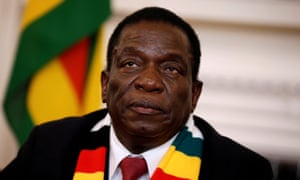Party briefing blames ‘rogue NGOs’ and ‘hostile intelligence services’ for violence
Source: West stirring up unrest in Zimbabwe to force regime change, says Zanu-PF | World news | The Guardian
Zimbabwe’s ruling party believes western powers are behind a “revolution” to bring about regime change in the country, according to documents seen by the Guardian.
Briefing papers prepared by Zanu-PF officials blame opposition parties and “rogue NGOs” for “an orgy of violence” following a protest against fuel price rises last month, accusing them of following a plan “by hostile elements to subvert the state by rendering the country ungovernable”.
The document is thought to have been produced by Zanu-PF officials for circulation among foreign diplomats at the African Union summit, currently underway in Addis Abbaba. It will concern observers already worried by the increasingly hard line taken by the Zimbabwean authorities.
The protests last month led to sporadic incidents of rioting and looting, which prompted a brutal crackdown by the police and the army.
The violence came 14 months after the 37-year rule of Robert Mugabe came to an end following a military takeover, and was the worst in Zimbabwe for at least a decade.
Police documents seen by the Guardian last week detailed the army’s role in a series of killings, rapes and beatings.
In a report published earlier this week, a coalition of local NGOs described a “de facto state of emergency” and a “reign of terror” by the security forces, which they accused of being responsible for 1,800 human rights violations.
They said these included at least 17 extrajudicial killings, 16 rapes, 26 abductions and more than 600 assaults.
“The violations are systematic, unleashed mainly by male perpetrators whom the victims identified as wearing either military or police attire, armed with AK rifles and or baton sticks, travelling in army and police vehicles. The targets of attack were initially male population in high density suburbs but later become indiscriminate to include women and young girls”, the report, by the Zimbabwe Human Rights NGO Forum, said.
More than 1,000 people have been detained in the crackdown, including labour leaders, activists and officials from the Movement for Democratic Change (MDC), the main opposition party. Many face lengthy sentences. Seven have been charged with subversion, which could lead to up to 20 years in prison.
Zanu-PF has denied all responsibility for the disorder.
The 24-page briefing document, seen by the Guardian, is titled: “Brief on the political and security situation in Zimbabwe in the aftermath of the 14th to 16th January violent protests.” It is dated 30 January and stamped “Government of Zimbabwe”.
“Anti-government protests are an instrument of choice for subversive elements, particularly the MDC, rogue NGOs, hostile [civil society organisations] and Hostile Intelligence Services (sic), keen to effect either regime change in Zimbabwe or force the consummation of a [coalition government of national unity],” the document says.
The Zanu-PF document describes the security forces’ response as “proportional to the threat posed”, though it adds: “Unfortunately some misguided elements within the system and the security forces committed excesses and the law is now taking its course.”
The briefing says reports of abuses are aimed at prompting western intervention in Zimbabwe.
Analysts are divided as to whether the more moderate position of the president, Emmerson Mnangagwa, who succeeded Mugabe and won a contested election last year, is genuine or designed to deflect foreign criticism.
The recent violence now means it is very unlikely that Mnangagwa, who has said the government “regrets” the loss of life but has defended the crackdown, will achieve his stated aim of ending Zimbabwe’s pariah status and unlocking the massive financial aid necessary to avert total economic collapse.
On Tuesday the UK said it would not back a bid by Zimbabwe to return to the Commonwealth because of recent human rights abuses and was “further” from backing any economic assistance package.
This suggests that basic commodities such as food, fuel and medicine will remain both scarce and increasingly expensive.
On Wednesday, Mnangagwa invited leaders of the more than 20 political parties that participated in last year’s disputed polls to a “post-election dialogue” at his State House office.
The talks were snubbed by the MDC leader, Nelson Chamisa, who said he wants any dialogue to be independently mediated by the Southern African Development Community (SADC), a regional organisation, and guaranteed by the African Union and the UN.
A Zanu-PF spokesman did not respond to requests to comment on the views contained in the leaked briefing.

COMMENTS
I humbly submit that the government must be “born again”. Continuing with RGM methods and arguments will not solve our problems. You do not get another person’s love and respect by telling them how ugly and evil they are, accusing them of witchcraft and ill intentions! We gain nothing from being combative, let’s just swallow our pride – the people have suffered enough. Let’s learn to win by loosing – learn from Japan and German after WWII.
Yep foreign governments raised the price of fuel wiping out the savings of the common folk. Foreign governments bought 25% of the national requirements of fuel 2 days before the price increases for Managagwa’s company. Foreign governments instructed Zimbabwe defence forces to shoot, rape, beat and torture its citizens.
Its never the government of Zimbabwe or ZANU PF, they are so unfortunate and picked on.